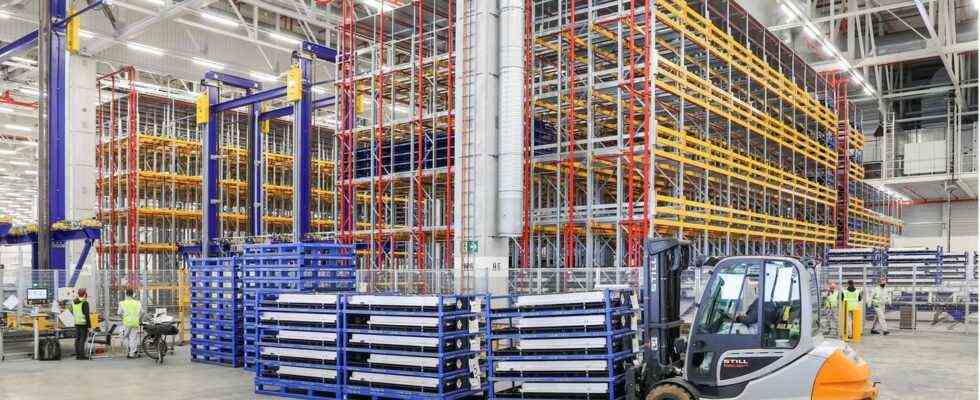Electromobility
The “largest and most sustainable” battery plant for electric cars is to be built in Portugal
Batteries are forwarded to a battery store for assembly (symbol photo)
© Jan Woitas / Picture Alliance
In order for electric cars to dominate the market in the future, batteries will increasingly be necessary. In Portugal, the “largest and most sustainable lithium plant in Europe” for batteries is to be built. The plant will produce lithium for hundreds of thousands of electric cars.
The transition to electromobility is a done deal for many car manufacturers. In order to achieve the goal of electrification, however, sufficient lithium must be available. Because the raw material is used in the batteries of electric cars. The Portuguese energy company Galp Energia and the Swedish battery manufacturer Northvolt have therefore founded the “Aurora” joint venture with which they want to build a plant for converting lithium in Portugal.
Battery factory should be “green”
As the companies announced on Tuesday, it will be “Europe’s largest and most sustainable lithium conversion plant”. For this purpose, “a proven conversion process (applied) that uses the latest process improvements and technologies to increase sustainability and efficiency” is to be used. “Aurora” wants to use green energy to minimize and ultimately avoid dependency on natural gas, they say. There is talk of a “milestone in the development of a European battery value chain”. “Aurora” is committed to “following the most environmentally friendly approaches”.
The location of the planned battery plant has not yet been determined. Investigations are currently ongoing. Paolo Cerruti, co-founder and Chief Operating Officer of Northvolt is certain: The joint venture “offers Europe not only a way to supply Europe with important materials that are needed for the manufacture of batteries, but also the possibility of setting a new standard for to set sustainability in the procurement of raw materials. “
Galp Energia and Northvolt estimate the investment at 700 million euros. In addition, up to 1,500 direct and indirect jobs are to be created with the battery plant.
With the start of production in 2026, up to 35,000 tons of lithium hydroxide for electric cars should be produced annually. The amount of energy should be 50 gigawatt hours (GWh) per year and cover the needs of around 700,000 electric cars. The companies anticipate that the lithium-ion battery industry will grow more than ten-fold by the end of the current decade.
Lithium funding for electric cars is about to be expanded
Other companies also want to build battery plants for electric cars. The Canadian raw materials company Rock Tech Lithium announced the construction of a lithium hydroxide plant in Guben, East Brandenburg, which should start production in 2024. Around 470 million euros are to be invested. The investment decision for all production steps still depends, among other things, on discussions about funding that has already been applied for or further funding, it said.
160 people are to be employed when the entire system is in operation. Around 24,000 tons of lithium hydroxide are to be produced each year, which should be enough for 500,000 electric vehicles. “Our goal is to be the first company in the world to create a closed cycle for lithium,” said CEO Dirk Harbecke. The US electric car manufacturer Tesla and the US battery manufacturer Microvast have also settled in Brandenburg. Tesla also wants to build a large battery factory in Gründheide.
Last Wednesday, VW announced a closed partnership with the Belgian recycling and material technology company Umicore and with the US start-up 24M. The group founded a joint venture with the former. In addition, lithium is to be promoted in the medium term from German incidents and renewable energy projects are promoted. A contract with Vulcan Energy provides for the delivery of lithium hydroxide from the Upper Rhine Rift. Delivery is scheduled to begin in 2026 and take place over a period of five years. Renault also signed a five-year contract with Vulcan Energy in the summer. The Stellantis Group also secured lithium supplies from Vulcan Energy from 2026 with a five-year contract, as Stellantis announced at the end of November.
In Europe, VW wants to build six factories for battery cells by 2030. In addition to Salzgitter, Skelleftea has already been set in northern Sweden, and a third location in Spain is likely. In addition to Northvolt, the car manufacturer is already cooperating with Gotion from China. The aim is to break through the still very strong dependency on external cell suppliers and to set up profitable large-scale production of our own battery systems. Northvolt also works with automakers such as BMW, Volvo and Polestar.
Sources: Press release Northvolt, Press release VW, Press release Rock Tech Lithium, Press release Renault, with material from dpa


